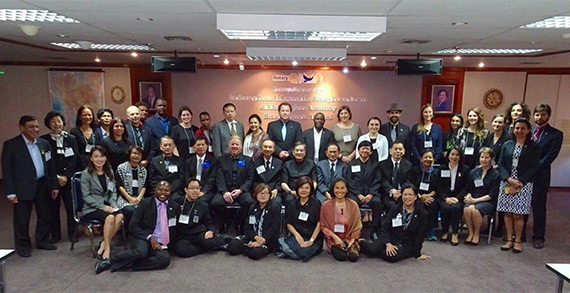By Hermanto Hasan, A Rotary Peace Fellow at Chulalongkorn University, Bangkok, Thailand, March 1, 2017, published in Rotary Voices
When I found out I was accepted for the Rotary Peace Fellowship at the prestigious Chulalongkorn University in Thailand, I was filled with happiness and also surprise. I had applied for several fellowships in the past, but all required a university degree, which I do not have.
I had started working while I was still a high school student as a humanitarian worker to help victims of conflict in my homeland of Aceh, and gave up the opportunity to go to university because I wanted to help my people in the middle of an escalating war. The fact that the Rotary Peace Fellowship valued my experience working in conflict over a formal university degree was unexpected to me, and I am extremely grateful and exited for this opportunity.
Unlike many people who choose to work in conflict-affected societies professionally, I grew up in the midst of one, in a province that faced an armed separatist conflict for 30 years. My hometown of Idi, in East Aceh, was one of the areas where the conflict was most intense. By the time I reached high school, I could no longer ignore the suffering of people around me — villagers displaced from their homes forced to live in camps, mosques, and schools; children who lost their parents; and mothers who lost their sons.
Humanitarian work kept me very busy, and I could not leave Aceh for years. I started my own humanitarian organisation and had the responsibility to lead and manage the organisation I created.
Now that I am outside of Aceh, I finally have the opportunity to think about the conflict from a new perspective and critical distance, while learning new concepts and theories. Just in the past few weeks, the course has helped me understand how the conflict in Aceh has transformed from open conflict to political conflict. This is helping me think more clearly about how to best respond to these transformations through my hope to develop conflict and peace education curriculum in Aceh.
The opportunity to study with classmates from 16 other countries is priceless, helping to open my knowledge and giving me the chance to learn about so many conflicts in other parts of the world. It is also a great experience to be in a class together with so many smart and wonderful people from different cultural backgrounds and histories. I am learning that people from all over the world have their own cultural and personal uniqueness.
For example, I have been fascinated by the sheer diversity of personalities among my African classmates — from Hope’s expressiveness, to Jane’s gentle and soft-spoken calmness. Never did I imagine I would study alongside professors Goran and Simon, or become classmates and friends with a police officer, Andy, or that a police officer could be one of the nicest gentlemen I have met. On top of everything we are learning in class, we are learning so much from each other — sharing stories, experiences, and laughs.
Thanks to this journey we are on together, I now have friends from so many parts of the world. I feel like we are already more than friends, we are a family. For someone who grew up witnessing how conflict can devastate and fragment communities and even turn sons against their fathers, this spirit of family means the world to me. Through this spirit we plant and cultivate the seeds of humanity.
Learn more about Rotary Peace Fellowships
Read the original article here.


Leave A Comment
You must be logged in to post a comment.